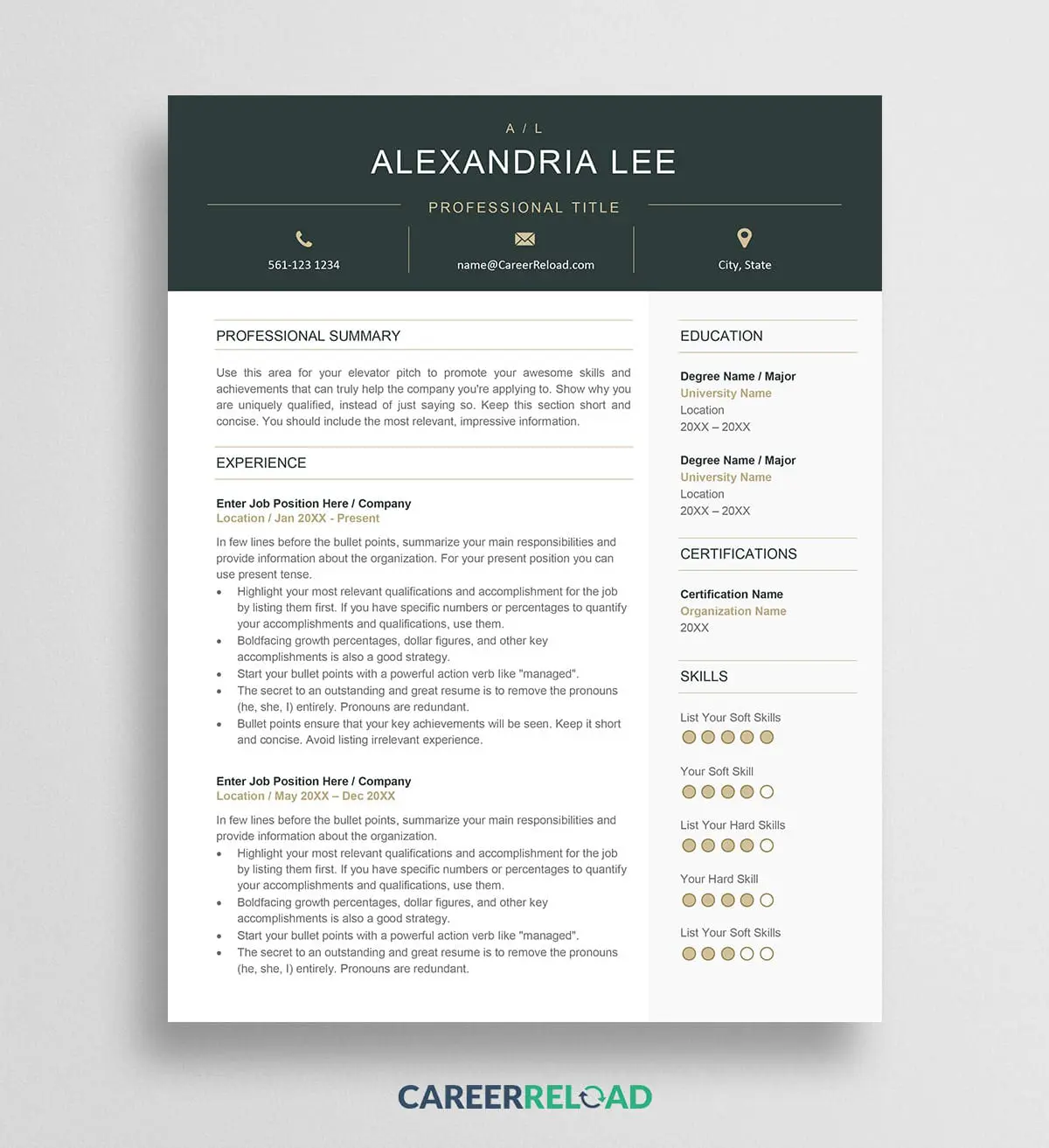When it comes to crafting a winning resume, knowing what to include is only half the battle. Equally important is knowing what to leave out. In fact, cutting certain things from your resume can actually improve your chances of getting hired. Here are some of the things you should consider removing from your resume.
1. Irrelevant work experience
It’s common for job seekers to include every single job they’ve ever had on their resume. However, this can be a mistake if the experience is not relevant to the job you’re applying for. Employers don’t want to sift through a laundry list of jobs that don’t relate to the position they’re trying to fill. Instead, focus on highlighting the experience that is most relevant to the job you’re applying for.
For example, if you’re applying for a marketing position, you should include any marketing-related experience you have, even if it means leaving out some unrelated jobs. Employers want to see that you have experience in the field and that you’re passionate about it. Including irrelevant work experience can distract from that message.
2. Objective statement
Objective statements are a thing of the past. These days, employers want to see a summary or profile section that highlights your skills and experience. Objective statements tend to be generic and don’t offer much value to employers. They also take up valuable space on your resume that could be used to showcase your qualifications.
Instead of an objective statement, use a summary or profile section to introduce yourself and highlight your relevant skills and experience. Tailor this section to the job and grab the employer’s attention.
3. Personal information
Personal information such as your age, marital status, and religious affiliation should not be included on your resume. This information is not relevant to your qualifications for the job and can lead to discrimination. This information is not required on your resume as employers cannot ask for it during hiring.
If you’re applying for a job in another country, you may need to include personal information such as your date of birth or nationality. However, this is the exception rather than the rule. In most cases, personal information should be left off your resume.
4. Mailing address
Including your mailing address in your resume is generally considered unnecessary in modern times for several reasons:
- Irrelevance: In the past, hiring managers might have used your address to send you physical mail. However, most communication now happens via email or phone. Your exact location is usually irrelevant until the later stages of the hiring process.
- Discrimination potential: Unfortunately, some employers may have conscious or unconscious biases toward certain neighborhoods or regions. By not including your address, you minimize the chance of being discriminated against based on where you live.
- Flexibility: Especially in fields where remote work is common, your physical location is often irrelevant. Emphasizing your willingness to relocate or your suitability for remote work can be more beneficial than stating your current address.
5. Multiple phone numbers
Employers typically appreciate straightforward, direct ways to contact applicants, and multiple numbers can seem unorganized or indecisive. It also increases the chance of miscommunication; if one number is less frequently checked, you might miss crucial calls or messages about interviews or job offers.
A single reliable number simplifies communication by centralizing your contact information. This makes it easier for you to track calls and messages related to your job search, reducing the likelihood of missing important information.
6. Unprofessional email address
Your email address is one of the first things employers will see on your resume, so it’s important that it looks professional. Using an unprofessional email address can make you appear unprofessional and can turn off potential employers.
If your current email address is something like partygurl87 or ilovebeer, it’s time to create a new, more professional email address for job hunting purposes. Stick to something simple, like your first and last name, or a combination of your first name and last initial.
7. Irrelevant social media profiles
When you apply for a job, every piece of information you provide should reinforce your qualifications and suitability for the position. Avoid adding irrelevant social media profiles as they can distract the employer from your relevant experience and qualifications.
By including only relevant and professional social media profiles, such as LinkedIn or a professional blog related to your industry, you ensure that employers focus on your most pertinent and impressive qualifications. This strategic approach demonstrates your ability to prioritize and convey information effectively, qualities that are valuable in any professional setting. It’s about curating your personal brand and image for potential employers.
8. Inconsistent formatting
Avoiding inconsistent formatting in a resume is crucial because it plays a significant role in creating a positive first impression. A resume with varied fonts, inconsistent alignment, or fluctuating bullet styles can appear unprofessional and disorganized. Inconsistency can distract the employer and raise doubts about your attention to detail and ability to produce quality work.. Employers often view a resume as a reflection of the applicant’s work ethic and standards; a well-formatted, cohesive document suggests a candidate who takes pride in their work and can communicate information in an organized manner.
Recruiters usually glance through resumes for a few seconds. A consistent format helps the reader quickly locate the most important information, like your experience, skills, and achievements. Additionally, many companies use Applicant Tracking Systems (ATS) to pre-filter resumes before the resume ever reaches a human reader. So, in addition to clean formatting, you want your resume to be ATS-friendly. You can make your resume ATS-friendly by avoiding elements that it can’t read.
Try some of these downloadable Word resume templates or resume templates for Google Docs:
9. References
References should not be included on your resume. Instead, provide them upon request. Your resume’s valuable space can be better utilized to showcase your qualifications instead of including references. It also puts your references in an awkward position, as they may be contacted before you’re ready for them to be.
Instead of including references on your resume, simply state that they are available upon request. Letting the employer know you have references and are willing to provide them gives you control over when and how they are contacted.

10. Overused buzzwords
Buzzwords like “synergy,” “team player,” and “proactive” have become so overused that they’ve lost their meaning. Using these buzzwords on your resume can make you sound cliché and unoriginal. Instead of using buzzwords, focus on using specific, descriptive language that showcases your accomplishments and skills.
For example, instead of saying “I’m a team player,” say “I collaborated with a team of five to develop a new marketing campaign that increased sales
11. More than 15 years of experience
While having a lot of experience can be a good thing, including the exact number of years you’ve been working can actually hurt your chances of getting hired. Employers may assume that you are overqualified or set in your ways, and may be less likely to consider you for the position. Instead, focus on highlighting your relevant skills and accomplishments, regardless of how long you’ve been working.
12. Salary information
Salary information should never be included on your resume. It’s important to remember that your resume is a marketing tool designed to showcase your skills and experience, not your salary requirements. Including salary information can give the impression that you’re only interested in the job for the money, rather than the opportunity to grow and contribute to the company.
If an employer asks for your salary requirements, it’s okay to provide a range based on industry standards and your experience level. However, this information should not be included on your resume.
13. A photo of yourself
Including a photo of yourself on your resume may seem like a good way to personalize your application, but it’s actually a bad idea. Employers should be focusing on your qualifications and experience, not your appearance. Including a photo can also open the door to discrimination based on age, race, gender, and other factors.
14. An explanation of why you want the job
While it’s important to convey your interest in the job, including a lengthy explanation of why you want the job is unnecessary and can come across as desperate. Instead, focus on showcasing your qualifications and experience, and let your cover letter or job interview serve as an opportunity to express your interest in the position and the company.
If you do want to express your interest in the job on your resume, keep it brief and to the point. For example, you could include a sentence like “Excited to apply my skills and experience to contribute to the growth of XYZ company.” This shows that you’re interested in the job, without going overboard.
In Conclusion
There are certain things you should remove from your resume to increase your chances of getting hired. These include specific information about your salary requirements, a photo of yourself, and a lengthy explanation of why you want the job. Additionally, while having a lot of experience is a good thing, including the exact number of years you’ve been working can actually work against you. Instead, focus on showcasing your relevant skills and accomplishments.
Your resume is a marketing tool designed to showcase your qualifications and experience, so make sure it’s tailored to the specific job you’re applying for. By avoiding these common mistakes, you can help ensure that your resume stands out to potential employers and increases your chances of landing the job.

Sara has been in the career development field for over 10 years and has a wealth of knowledge to share. She covers topics such as resume writing, job search strategies, interview techniques, career planning, and more. You can connect with her on LinkedIn and Medium. She has curated our free downloadable resume templates for Word and resume templates for Google Docs.




Others also read
How to Network on Social Media When Job Hunting
How TikTok Can Help You Improve Your Career
Medical Assistant Resume Example & Template
How to List School Projects on Your Resume
Financial Analyst Resume Examples to Land Your Dream Job
How to Build Your Professional Network
Resume Summary vs Objective – What’s The Difference
How to Create a Social Media Strategy for Job Search
You Might Also Like These Free Templates
Google Docs Resume Format – Debbie
Free Resume Form Template
Free Resume Design – Megan
2 Column ATS Resume Template
ATS Friendly Resume Format for Word – Lindsay
Goal Planner Template
Cover Letter Template with Monogram
Professional Cover Letter Template
Free Modern Resume Template for Word
Free Job Application Tracker for Excel
Free Resume Template Download for Word – Farrah
Free ATS-Friendly Resume Template – Emily